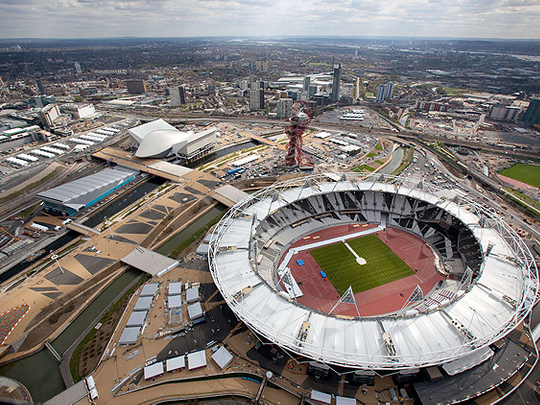
Dubai: Legacy. Sustainability. Recycling. Costs. These are the four mantras driving the organisers through the preparatory phase of the 2012 London Olympic Games as the day of reckoning draws closer.
When the city of London — and the United Kingdom — prepares to host the world in what is the greatest sporting spectacle — from July 27-August 12 — all eyes will be fixed on Great Britain.
London is no stranger to hosting Olympic Games. This summer, it will endeavour to stage it successfully for the third time. In 1908, London stood in as the host city for Rome after Mount Vesuvius erupted. In 1948, it stepped in at the last minute after the Second World War. This time, however, it is not hosting by proxy. Rather, the 2012 Games will be seen as one that could prove to be a litmus test for a country that is walking on a knife-edge between stupendous success and spectacular failure. Everything that signifies the best of what Britain has given to the world is at stake.
Having won the bid to stage the Olympics on July 6, 2005, after beating off an inspired presentation by long-term favourites Paris, London has travelled through a period of celebration coupled with precise planning and painstaking preparation to come face to face with another reality just before the Games: double dip economic recession.
Paris had prepared a faultless bid, but London promised a ‘great legacy' to the International Olympic Committee (IOC) in its presentation. That one word swayed the voting in their favour. Former British Prime Minister Tony Blair told reporters, during an official visit to Singapore, that London prevailed because the "British people were behind the bid".
Sadly, the crowds that celebrated on what Blair termed a "momentous day" in 2005 have disappeared from Trafalgar Square. They have either gone to work, or in search of gainful employment. The vignettes of celebration have been replaced with a mood of cautious optimism and ambivalence as the citizens of the world's most popular and multi-cultural city grapple with joblessness and rising costs. The Olympic clock steadily ticks away in Trafalgar Square, as tourists and locals amble around it, like a ticking time bomb that could be defused, or explode.
All is good about London
While the officials of Britain's Foreign and Commonwealth Office happily field questions from a visiting media delegation espousing on all that is good about London and its preparations, there is the underlying apprehension that the total benefits promised from the Games may not be realised. Recession has put the government on the back foot and provided fodder for those who champion austerity. Recovery is taking longer than expected and the task of returning to growth has been made harder with the rest of the European economies also in decline.
Should it be successful, however, London could provide countries harbouring ambitions of staging the Olympics in the future with a noteworthy blueprint on how to stage cost-effective Games.
With Europe reeling from an economic crunch and most governments slashing their budgets, practicality is the order of the day. It is this quality that the officials of the London Organising Committee of the Olympic Games (LOCOG), and everybody else associated with the event, are highlighting to the media.
To be fair, the organisers have prepared well despite prevailing conditions. Planning is ahead of schedule and costs are being contained.
Speaking to the media in the India Room of the Foreign and Commonwealth Office, Sir Charles Allen, chair of the London 2012 Nations and Regions Group, declared the Olympics could go on to provide economic, social and sporting benefits.
"At least £7 billion (Dh40.3 billion) in contracts have gone to British companies," Allen said.
"A total of 40,000 jobs for contracts have been given outside Britain. We believe that earnings from tourism — pre, post and during the Games — should be around £2 billion and at least £10 billion worth of economic benefit would be spread through the country."
Allen and his group have been entrusted with the task of ensuring that the whole of the UK can participate in and gain maximum benefit from the Games. While he admitted that the British people, in general, "tend to get excited about most things at the last minute", Allen hoped that the whole nation would eventually turn up and "display their Olympic spirit". Part of this display was going to be the nucleus of the social benefit that the organisers hoped to reap.
"At least 95 per cent of the population should be close to the torch relay as the Olympic torch travels through the country. We want it to be the people's Games," said Allen.
"There will be at least 8,000 people carrying the torch and they will tell the story of ordinary people who have done extraordinary things." That apart, there will be 7,000 volunteers, culled from a total of 250,000 applicants, and 24,000 schools which have been engaged so that students can familiarise themselves with the Olympic venues.
And as far as the stadia are concerned Allen declared that there would be "no white elephants". "Most of them would be dismantled, or resized, to accommodate future plans," he said.
Beneficial impact
LOCOG officials are hoping that there will be a clear beneficial impact on British society after the last Olympic medal has been won and the government begins to count the costs and prepare feedback for the tax-payers. In many ways, this legacy is projected to be two-fold: material and the physical. It is designed to spread to five important areas of society namely:
- Youth — where the London Olympic Games have reached out to young people in the UK and around the world, connecting them to sport.
- Sport — the vision and preparations for London 2012 have put athletes and sport at the heart of the Games and made sports participation a high priority
- People — central to the whole London 2012 project has been ensuring that the Games are inclusive and open to everyone irrespective of their age, race, disability, sexuality, gender or belief.
- Transformation — the Olympics and Paralympics Games have been the catalyst for the physical transformation of a huge area of East London.
- London and the UK — the London 2012 games have focused from the start on welcoming the world to a city and country that are diverse, vibrant and that have embraced sport.
Of all the tangible differences that can be seen at the present the Olympic Park venue in East London, or the Lower Lea Valley, has its own story to tell. Once seen as one of the most decrepit areas in the city, housing for the past 400 years heavy industries, it later became a giant domestic and industrial landfill.
It was brave of the organisers to announce this spot as the main venue for the Olympics. Thereafter, it became an advertisement for British ingenuity, ascetism and engineering. Soil washing machines were used to successfully clean more than 1.4 million cubic metres of contaminated earth on the site, 80 per cent of which was reused on the park.
Recycled
Electricity pylons were cleared and moved underground. Buildings were demolished and materials re-cycled or re-usued elsewhere. Waterways were dredged and the new Olympic Park, with multiple venues, was then completed on time and within budget by the summer of 2011 thus endorsing the organisers' philosophy of legacy and sustainability.
Addressing the media during a tour of the venue James Bulley, director of venues and infrastructure, said: "Sport and sustainability is at the heart of everything that is at the core of this Olympics. The Olympic Village should offer a total of 2,800 new homes.
"The units currently have no kitchens, as we want the athletes to eat in the common dining rooms, but after the Games they will be refitted with kitchen units. We have one, two and three bedroom units as well as townhouses that will go on sale, but 40 per cent of this has been committed to social housing benefiting the lower income group."
The construction of the Olympic site has sent property prices soaring in the area and residents are finding it difficult to cope. Thanks to the recession and rising unemployment many of them are now choosing to vacate and leave for poorer areas of the city where rents and housing costs are low. The future does not bode well, but Bulley was quick to highlight the fact that the area still held promise.
"The dynamic for people living here will be transport," he said. "Transport facilities are attractive here thanks to the ten new train lines that will be set up.
"Connectivity, therefore, is the key — 230,000 people will be able to get into the city in an hour. It also connects to Europe. Workers will find it convenient apart from the facilities that are available like schools and poly clinics making for an enhanced new London which is eco- and environment-friendly."
Andrew Mitchell, FCO director of Olympics and Paralympics, highlighted the organiser's choice of venue as well the government's approach to the event. "The choice to put the Olympic stadium in a deprived area of London is a challenge and an opportunity," he said.
"We are aware of the difficult economic circumstances that are currently prevailing through much of the UK and Europe. It is gloomy, but the Olympics is firstly an international story and not just a domestic one.
"It is important for us that the Games be held in an austere environment. We have spent a total of £9.3 billion and at least 85 per cent of this has gone to British business.
"We are aware that the people will hold us accountable after all this is over.
"Legacy is important to the bid therefore," Mitchell added.
"However, legacy is broader than the simple question of deals and business. It is the values of a country and a society -—which is why we chose East London.
"We hope to unleash everything that is the best in British society — our sporting, social and cultural festivals will be the biggest in Britain and I can assure you that we do culture very well in this country.
"Britain will go through a process of re-branding itself during this phase," Mitchell continued.
Ad campaigns
"‘Great' will be the operative word and our ad campaigns are visible everywhere. We would like to capitalise on four billion sets of eyes that will be trained on London.
"What we want to do is turn it into something that speaks to business, culture and economics through the Olympics. We would like to talk to people on why it is important for them to view England positively."
One way of assuring that is by ensuring adequate security. Last year's race riots which engulfed London "challenged our security systems", Mitchell admitted. "It provided a robust trial and we always have to be prepared for a situation where extraordinary things could happen," he said.
Lack of police personnel was seen as a major drawback during the riots. During the Olympics the security outline has been listed as 13,500 army, air force and navy personnel, 12,000 police, 13,200 private security personnel and 3,000 volunteers. This is against a budget of £553 million.
Security
Warplanes, two navy ships, including a helicopter carrier stationed in the River Thames, and surface-to-air missiles are to be on standby with some even being stationed in residential areas like Canary Wharf. Needless to say, residents are wondering what's next.
Since March this year when Jacques Rogge, president of the International Olympic Committee, praised London as having the ‘legacy blueprint' for future Olympic Games, the scenario has changed a bit. To be fair to London, and the projections the authorities have made, it could take a few years before the results of their efforts will begin to show and when that happens the parameters of success may once again be redefined by those who fought to get the Olympic Games into the city.










